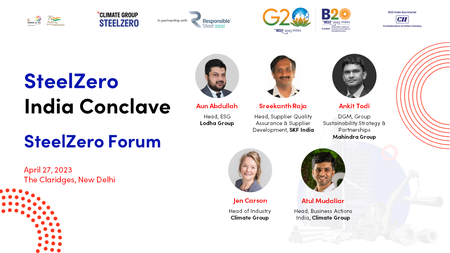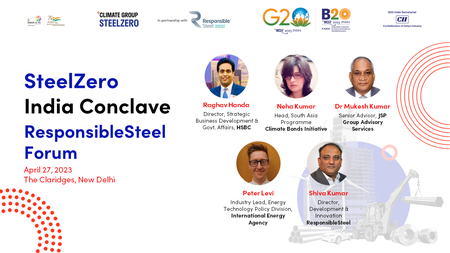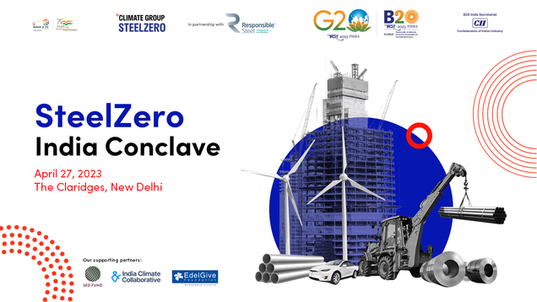With India’s G20 presidency this year, this is a significant moment to capitalise on the momentum of India’s climate leadership. To celebrate India’s ambition and action towards moving to a net zero economy by 2070, we hosted the SteelZero India Conclave on April 27th in New Delhi. This was an official B20 event, organised in partnership with Confederation of Indian Industry (CII) and ResponsibleSteel. The Conclave was part of a series of discussions and policy advocacy forums being held across India with an overall aim to realise the G20’s strategic vision, with actionable policy recommendations.
The tone of the full-day Conclave was set by opening addresses from Divya Sharma, Executive Director India, Climate Group, and Shikhar Jain, Deputy Head of CII-ITC Centre of Excellence for Sustainable Development.
Divya Sharma explained the significance of addressing steel decarbonisation in India, as the sector contributes 12% of the country’s total greenhouse gas emissions and will therefore be key to decarbonisation of heavy industry in general, particularly considering India’s 2070 target of net zero emissions.
Shikhar Jain, in his address, stressed upon the importance of learnings from other G20 nations in the decarbonisation journeys that they have followed. He also highlighted the role of B20 and G20 as a forum for boosting trade initiatives, investments and economic growth, and how the topics of energy, climate change and resource efficiency intertwine with those priorities.
The opening addresses were followed by two presentations on SteelZero. The first of these was a detailed overview of the SteelZero initiative and explained the impact that companies around the world are creating through their collective demand for net zero steel, and displaying their climate leadership in doing so. The second presentation talked about the findings from the India Net Zero Steel Demand Outlook Report, which was published by Climate Group in January this year.
SteelZero Forum
This was the first panel discussion of the day and hosted a dialogue between prominent corporate steel buyers to discuss challenges and unlock ideas for a robust demand for net zero steel in India. The panellists included senior representatives from Mahindra Group, Lodha Group, SKF and Climate Group’s global Head of Industry.

Some of the key takeaways that emerged from this discussion:
- There is an understanding among companies, policymakers and other stakeholders of the complexities involved in decarbonisation of steel. One of the goals of the SteelZero initiative is to bring together these stakeholders and identify common terms of reference that the whole ecosystem can deliberate on.
- The speakers stressed the importance of collaboration as no one company can work in isolation to eliminate fossil fuels emissions from steel production.
- More automotive manufacturers are now setting internal net zero targets to be achieved over a period of time. This has had a cascading effect on the upstream supply chain, resulting in greater expectations from suppliers to supply low carbon products in order to comply with the customer’s requirements.
- More than one third of the overall GHG emissions come from the construction and operations of the built environment, with embodied emissions from steel being a major source. Therefore for any effort to decarbonise the built environment, finding solutions to low carbon steel is essential.
- The supply chain, particularly in the construction sector, is very data scarce which makes it difficult to track emissions.
- In the auto sector, a disproportionately high percentage of the emissions are scope 3. While most of it comes from downstream emissions from the burning of fuel, the next biggest decarbonisation lever is embodied emissions from steel.
- For the uptake of green steel to become mainstream, the premium paid needs to be pragmatic and commercially viable. Market mechanisms will have a key role to play here since it wouldn’t be realistic to fully pass on the increased costs to the end consumer.
This was followed by an interactive Q&A session during which the panellists took questions from the audience. One of the themes brought up during this session was around green premium associated with procurement of green steel and some of the possible mechanisms that companies could use (e.g., internal carbon pricing) to avoid passing it on to the customer. There were also a few questions on the effect of Carbon Border Adjustment Mechanism and its impact on the export strategy of companies that export to the European market.
ResponsibleSteel Forum
his was the final session of the day and included a panel discussion moderated by ResponsibleSteel, which is Climate Group’s global partner on SteelZero. This was a dialogue between the other stakeholders essential to the decarbonisation of steel, such as steel suppliers, financial institutions and policy thinktanks. Panellists included members from IEA, JSP Group, HSBC and Climate Bonds Initiative. The discussion was preceded by a presentation on ResponsibleSteel.

The major takeaways from this discussion were:
- IEA recently published a report on benefits of advancing Lifestyle for Environment (LiFE) initiative, with one of its key pillars being energy transition. The analysis suggests that around 20% of the emissions reduction required by 2030 for a global net zero emissions trajectory by 2050 can be achieved by behavioural changes and personal consumption choices.
- India is one of the key focus countries of engagement for IEA, with IEA working closely with the Indian government during its G20 presidency year.
- In addition to GHG emissions, environmental and social factors are also key strategic drivers for Jindal Steel & Power Ltd (JSPL). The company is using coal gasification in order to maximise utilisation of domestic resources and minimise dependence on imported raw materials. Today, JSPL captures more than 2000 tonnes of carbon dioxide and is looking to go further.
- The importance of addressing the large funding gap was discussed, particularly for Ministry of Micro, Small and Medium Enterprises (MSMEs), startups and other vulnerable sectors that need credit for green steel transition.
- The absence of taxonomy and a shared vocabulary around green steel transition was identified as a bottleneck that needs to be addressed.
- In India, the sustainable financing landscape is dominated by GSS (Green, Social and Sustainability) bonds, USD 25 billion worth of which have been issued so far. Nearly half of these issuances have been certified by Climate Bonds.
The day concluded with a closed group discussion between companies from automotive and construction sectors, as the first of a series of focused sectoral working group sessions. Climate Group will convene these groups regularly.
SteelZero in India is supported by the India Climate Collaborative, Stichting SED Fund and the We Mean Business Coalition.
